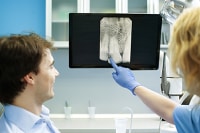
When we want to detect diseases and damages that are not visible during a typical dental exam, we use a dental X-ray as a diagnostic tool.
How often X-rays need to be taken is dependent on your age, risk of disease, the present oral state and the occurrence of signs and symptoms of oral diseases. For new patients, dentists recommend a dental X-ray to determine the current oral health status and to create a baseline for future references.
To determine the status of your gum health, detect new cavities or examine the progress of tooth development, a new set of X-rays may be needed as guidance. If your previous dentist made any radiographs of you, we might ask you to bring us copies of them.
Are they safe, though? Yes. However, very low levels of radiation exposure are required, which reduce the potential of harmful effects occurring. The tools and techniques used for dental X-rays are designed to limit the exposure of radiation to the body. Precautions are taken to ensure the radiation exposure follows the ALARA principle (as low as reasonably achievable).
The Risks of Dental X-Rays
Yes, dental X-rays involve some form or level of radiation. However, the exposure levels are very low that they are concluded to be safe for both adults and children. Your risks from radiation are even lower with digital X-rays as compared to developing them on some sort of film.
A lead “bib” will be placed over or across your chest, pelvic region and abdomen to prevent your vital organs from getting any unnecessary radiation. In the case of a thyroid condition, a thyroid collar will be used. However, women who believe that they are pregnant or are pregnant should always try to avoid all types of X-rays. You should inform us if you think that you are pregnant because radiations are not safe for developing fetuses.
The Necessity of X-rays
Just like flossing or brushing your teeth, getting regular X-rays should be an integral part of your overall oral health. Going for occasional checkups can be useful, but this does not mean you should ignore X-rays. Depending on your health, age and insurance coverage, we might perform X-rays everyone to two years. If we find problems such as decay or cavities, we can discuss the treatment options. Be sure to book an appointment with us soon if you experience any pain or other changes in your mouth.
